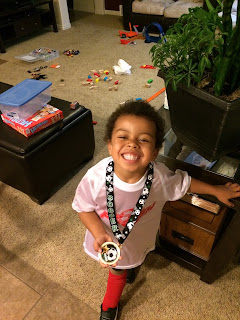Guiding Our Children-- Avoiding Harsh Discipline
 |
| Blogger's personal photo |
I get it. Life can be so overwhelming sometimes. Personally speaking, my child didn’t come with a manual. Did yours? Also, isn’t it so true that you know everything about parenting when you aren’t a parent yourself? Nothing prepared me for the ups and downs of teaching, disciplining, and guiding my child. However, when I have an attitude that I am already the perfect parent or that because I turned out “fine” I can just parent as my parents did, I think I’m missing out on all that I can learn. I hope that by sharing bits of information I have gleaned; I can help you to see that you don’t have to hold on to those notions either!
Every experience we encounter with our children can be an opportunity to improve upon the way we correct behavior and guide our children.
Let’s start with direction from the scriptures. Where can we find doctrine that might provide us with answers as to how we should be when it comes to guiding our children? In Doctrine and Covenants 121:43 we read: “Reproving betimes with sharpness, when moved upon by the Holy Ghost; and then showing forth afterwards an increase of love toward him whom thou hast reproved, lest he esteem thee to be his enemy.” In this verse, we learn that as we correct our children, we should be doing it with quickness, patience, truth, love, and through the promptings of the Holy Ghost. Something I studied recently is the meaning of the word reprove. I fear that many are as confused about its definition as I was. Reprove is “to scold or correct usually gently or with kindly intent” (Merriam-Webster, n.d.). In all we do as parents, we should do it tenderly.
Dr. Laurence Steinberg has authored a book titled 10 Basic Principles of Good Parenting. His 8th principle in the book is “Avoid Harsh Discipline”. This principle focuses on four areas and I will mention each of them and expand on them.
Never Use Physical Punishment
No matter how frustrated, annoyed, desperate, or fed up you are, you should never spank, hit, slap, or otherwise physically punish your child” (Steinberg, 2004). Using physical punishments can create harmful side effects. The main side effect being disproportionate hostility and violence. A parent who hits, spanks, slaps their child will find that their child will be more likely to fight with other children even to the extent of being a bully. This is because they have been taught that these behaviors are acceptable ways to solve problems. The American Psychological Association has stated that spanking specifically can elevate a child’s aggression levels as well as diminish the quality of the parent-child relationship (American Psychological Association, 2019). Never resort to physical punishment no matter how angry you are or what your child has done.
Don’t Be Verbally Abusive
Being verbally abusive over time can negatively affect a child’s development. In fact, kids who have been verbally abused by their parents often have more psychological problems and are at greater risk for things like depression and low self-esteem. “Being firm does not require being mean. They are two completely different things” (Steinberg, 2004).
Controlling Your Anger
Don’t discipline your child when you are angry. It’s a normal human emotion to feel anger towards them every now and then. I love the advice Dr. Steinberg gives when you are in the heat of the moment. He talks about taking deep breaths and counting to three and immediately letting your child know that you are upset. If the child is older you can even tell them that you aren’t in the right frame of mind to talk about it at the moment but that you will be conversing about it later. Just make sure that when you are cooled down, you do something (such as provide an associated consequence).
The Right Way to Punish
Steinberg’s final area is reflecting on how to punish the right way. I had the opportunity to test out his five steps for effective punishment. They are:
• Identify the problem
• Discuss the impact it has on those involved
• Discuss an alternative
• Implement consequences (punishment)
• Explain future expectations
I’ll give you a pretend dialogue to demonstrate. Let’s say your daughter has a curfew of 11:00 pm and comes barreling in the house at 1:00 am. Let’s see how we can “punish the right way”.
Daughter: “I’m so sorry I’m late!”
Mom: “Susan, you know that your curfew is 11:00 pm and it is now 1:00 am.” (identify)
Mom: “When you are out past curfew it makes me and your father worried and concerned that you aren’t safe. Your safety is also at risk when you are running around in the early hours without anyone knowing your whereabouts.” (impact)
Mom: “If you want to stay out late, contact me and we can discuss together.” (alternative)
Mom: “Because you broke curfew, you will be grounded from friends for a week.” (punishment)
Mom: “In the future, I expect you to follow our curfew rules and I trust that you will do so.” (future expectations)
Can you rehearse in your mind a situation or problem that you have had recently with your child where using these steps would have been a helpful guide? I hope you’ll give them a try in the near future.
Another resource that you might find beneficial is this article published online by Premier Health. It supports many of the things discussed on this blog and provides 11 ways to discipline with love and not fear (Mortsolf, 2018).
We don’t have to correct our children with rudeness or anger or any type of corporal punishment. Instead, we can punish the right way and use it as a teaching moment to guide our children. By following this path, our children will be strengthened in self-confidence and ability. I think we all want that for our children. I know I do!
References
American Psychological Association. (2019, May). Physical discipline is harmful and ineffective. https://www.apa.org/monitor/2019/05/physical-discipline
Merriam-Webster. (n.d.). Reprove. In Merriam-Webster.com dictionary. Retrieved February 6, 2021, from https://www.merriam-webster.com/dictionary/reprove
Mortsolf, C. (2018, April 26). 11 ways to discipline with love, not fear. Premier Health. https://www.premierhealth.com/your-health/articles/women-wisdom-wellness-/11-ways-to-discipline-with-love-not-fear
Steinberg, L. (2004). The 10 basic principles of good parenting. Simon & Schuster.


Comments
Post a Comment